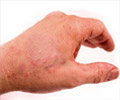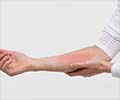The harmful irritants of hard water could damage the protective skin barrier and can make the skin vulnerable to eczema.
Highlights
- Hard water can damage the protective layers of the skin that shields the skin from sunburn, bacteria.
- Hard water is water that has a high mineral content as opposed to soft water, which makes it unsuitable for common use.
- Washing the skin with hard water may contribute to the development of eczema.
Minerals in Hard Water Can Affect Skin
Hard water consists of high levels of calcium and magnesium ions that bind to surfactants such as sodium lauryl sulphate (SLS) and sodium lauryl ether sulfate (SLES) which act as detergents or wetting agents making them insoluble.
The researchers said that the surface of skin is normally acidic on the pH scale , but hard water has high alkalinity and can raise the skin surface pH. A shift towards alkaline pH disturbs the skin’s natural function of acting as protective barrier and makes it prone to infection.
"By damaging the skin barrier, washing with hard water may contribute to the development of eczema - a chronic skin condition characterized by an intensely itchy red rash," said Simon Danby, from the University of Sheffield.
Eczema patients were more prone to infections than people with healthy skin when they were exposed to hard water. A genetic predisposition to a skin barrier defect brought about by mutations in the gene encoding filaggrin (a structural protein important for the formation of our skin’s barrier) increases skin sensitivity.
"For that reason we are now embarking on a pilot trial to investigate whether installation of a domestic water softener around the time of birth can prevent skin barrier breakdown and eczema in those living in hard water areas," said Flohr.
Causes of Eczema
Hypersensitivity reaction in the skin causes atopic dermatitis or eczema. Atopic dermatitis patients may lack certain proteins in the skin, which leads to greater sensitivity.
Though the exact cause is unknown, exposure to environmental irritants like pollen, mold, dust mites, or animals, sudden temperature changes and exposure to chemicals can increase the risk of eczema.
Symptoms of Eczema
- Intense itching
- Blisters (vesicle formation) with oozing and crusting
- Skin redness or inflammation around the blisters
- Rash- Skin lesions begin on the cheeks in infants and may progress to the scalp, arms, trunk, and legs. While in children and older adults the rash is more commonly located in the inner elbow or behind the knee.
- Dry, leathery skin areas (lichenification)
- Ear discharge/bleeding
Source-Medindia
















